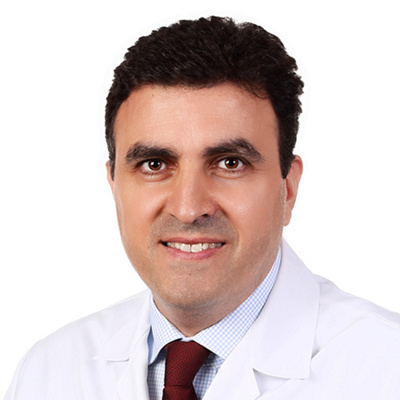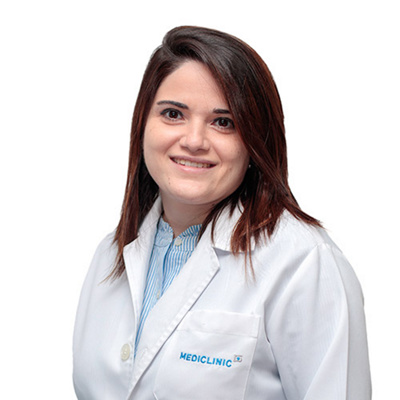Mediclinic City Hospital has established itself as a leading transplantation centre.
This centre is led by Dr Waldo Concepcion and a team of specialists, who through their pioneering of transplant surgeries are transforming the UAE organ transplant landscape.
In striving to promote and develop the discipline of organ transplantation in the UAE, the centre is able to successfully transplant solid organs in both children and adults.
The transplant centre at Mediclinic City Hospital enjoys a strong and supportive partnership with Mohammed Bin Rashid University (MBRU) and Al Jalila Children’s Specialty Hospital. The teams together play a significant role in propelling transplant to the forefront of healthcare, in the process helping to raise awareness of the nation's laws on organ donation and transplant and making the service available to the UAE's citizens and residents.
The transplant centre offers patients suffering from end stage renal disease an alternative to dialysis, which in turn provides them a better quality of life. Both deceased donor and live donor transplants are performed at the unit, offering families the opportunity to explore the option of being a live kidney donor.
The transplant team provides quality, comprehensive and multidisciplinary care for potential transplant recipients and donors, from initial consultation through to the realisation of donation or transplant, and beyond.
Transplant programme
The Mediclinic City Hospital transplant programme is committed to providing safe, effective and patient-centred transplant services in Dubai.
A kidney transplant is a surgical procedure in which a healthy kidney from a living-related donor or a deceased donor is transplanted into someone with failing kidneys.
What is a deceased donor?
A deceased donor is someone who had registered to be an organ donor during his/her life or whose family has consented to donating his or her organs upon death to make a difference to someone else’s life.
Deceased donors are brain-dead; with no life-sustaining activities in the brain. The diagnosis is made by a specialised team of physicians who conduct extremely precise testing that confirms the brain-death diagnosis.
In the event that the deceased donor's wishes are unknown, the family members may consent to organ donation.
To register for organ donation, please use the link below: https://mohap.gov.ae/en/services/social/organ-donation
What is a living-related donor?
A living-related donor is a person who is a blood relative of the potential recipient:
- Relatives up to the 4th degree may be accepted for living donation
- Currently, unrelated donors are not accepted and proof of relationship will be required at time of assessment in order to proceed to donation
- The living donor has a very special role and must be genuinely willing to donate. They cannot receive gifts of any kind, payment or favours in return for their donation. The donor must also be free from any compulsion or pressure to donate from any party. This is to protect the donor's best interests and ensure their safety
Worldwide, it is recognised as illegal and a crime for anyone to receive payments or gifts in exchange for an organ. It is also a crime to pressure or coerce someone to donate their organs. This is applicable to living donors and deceased donors and their family members.
Get Started – Is Kidney Transplant right for you?
Kidney transplant offers better quality of life and transplant patients would be able to live longer compared to dialysis patients. Anyone who has reached end stage kidney disease is eligible to be worked up for a kidney transplant. There is no age minimum or maximum for transplant. However, recipients should be healthy enough to withstand the transplant surgery.
Pre-transplant tests will determine the recipient's eligibility.
What is Kidney Failure?
Kidneys have five main jobs:
- Filter waste from your blood
- Regulate fluid balance
- Balance the acid within your body
- Help control blood pressure
- Help make red blood cells
- Activate vitamin D for healthy bones
Kidney disease is common but for most people it is mild or moderate.
About one in 10 people with kidney disease develop kidney failure. This is when your kidneys no longer work well enough to keep you healthy, and you need dialysis or a kidney transplant to stay alive.
Kidney disease stages
Stage 1 - early signs of damage shown on tests. 90% kidney function
Stage 2 - mild. 60-90% kidney function
Stage 3 - moderate. 30-60% kidney function
Stage 4 - severe. 15-30% kidney function
Stage 5 - kidney failure. Less than 15% kidney function. Many people with chronic kidney disease (CKD) will not have symptoms because it does not usually cause problems until it reaches an advanced stage.
Early stages of CKD
Kidney disease does not tend to cause symptoms when it's at an early stage.
This is because the body is usually able to cope with a significant reduction in kidney function.
Kidney disease is often only diagnosed at this stage if a routine test for another condition, such as a blood or urine test, detects a possible problem.
If it's found at an early stage, medicine and regular tests to monitor it may help stop it becoming more advanced.
Later stages of CKD
A number of symptoms can develop if kidney disease is not found early or it gets worse despite treatment.
Symptoms can include:
- weight loss and poor appetite
- swollen ankles, feet or hands – as a result of water retention (oedema)
- shortness of breath
- tiredness
- blood in your urine
- an increased need to urinate – particularly at night
- difficulty sleeping (insomnia)
- itchy skin
- muscle cramps
- feeling sick
- headaches
- erectile dysfunction in men
This stage of CKD is known as kidney failure, end-stage renal disease or established renal failure. It may eventually require treatment with dialysis or a kidney transplant
Who can have a kidney transplant?
Most healthy people would benefit from a kidney transplant however, there are some contraindications and they include:
- Untreated, uncontrolled cancer
- Active systemic infections
- Any condition(s) with a life expectancy < 2 years
- Untreated cardiovascular disease
- Chronic respiratory dysfunction
Each individual case is different, and there could be some exceptions based on the potential recipient's health condition. To understand your eligibility please get in touch with one of our nephrologists, you can view their profile and book an appointment by clicking on the link here.
What are the steps involved?
Discuss with your doctor
Your kidney doctor will be able to advise on whether a kidney transplant is the right treatment for you. They will discuss the benefits and risks with you, along with possible alternative treatments. Having a kidney transplant is a big decision and every patient's case is unique.

Pre – eligibility tests
To be active on the transplant wait list, the recipient must go through the pre-transplant testing and be free from any of the contraindications to transplants
Click here to read more.

Waiting for a Kidney
After the eligibility tests are conducted you will be listed on the national transplant list and wait to be matched with a suitable kidney. If you are offered a kidney, your transplant team will contact you directly and guide you on the next steps. The potential recipient is expected to maintain his/her health in the best possible state while awaiting transplant. The wait time could be short or long depending on the availability of the deceased donors or a matched living donor (family member up to fourth degree). The recipient should continue dialysis (if already started), and maintain appointments with the nephrologist and blood draws (for PRA screening)
To learn more about how a kidney is allocated, click here.

Admission to the transplant unit
If you are one of the potential recipients matched for a deceased donor kidney, the transplant coordinator will call you. This phone call could happen at any time of the day or even during the night. They will ask you a few questions about your state of health such as if you have a cold, the flu, any infections and if you have received any blood transfusions. It is important to be healthy at the time of your transplant.
They may ask you to come in right away to give a fresh blood sample for the HLA Crossmatch test.
The result of the Crossmatch is usually available within 12 to 24 hours. At this point you will find out if you are the one to receive the donor kidney or not.
The team calls three to four possible recipients for every deceased donor kidney. You may be called in more than once before you successfully receive a kidney transplant.

During Transplant
The Surgery
There are many different ways that a kidney can be transplanted. The surgical team caring for you will explain their preferred technique, and which would be best for you. Most of the time, a single kidney is placed into either the right or left groin (lower abdomen).

Recovery
The recovery period for the transplant will vary from one patient to another. Generally, the hospital stay is expected to be from 5-7 days, sometimes longer. For more information click on the following link

Medication
Before you leave the transplant centre, you will be given detailed information about your new medicines and how to take them. You’ll also be told what other medicines to avoid.
For more information on these click here

Living with Transplant
After a kidney transplant, your energy levels will improve, you would have a better appetite, in most cases there will not be any dietary or fluid restrictions. Most kidney transplant recipients can return to work and other normal activities within eight weeks after transplant. No lifting objects weighing more than 5kg or exercise other than walking until the wound has healed (usually about six weeks after surgery). You should be able to drive by six weeks post-surgery.
Your new kidney may pass a lot of urine in the first few weeks and you would have to drink plenty to keep up with the fluid requirement, in the first month you would be expected to attend the hospital two to three times a week for out-patient appointments, so we can keep a close eye on your transplant function.
It's normal to feel anxious or overwhelmed while waiting for a transplant or to have fears about rejection, returning to work or other issues after a transplant. Support is available if you or your loved ones are struggling or if you need to talk
Medication
You would be on immunosuppressive medications for the rest of your life in order to prevent rejection of the transplant kidney, during the hospital out-patient visits your blood tests will be monitored so we can adjust the levels of these medicines and also monitor for any potential side effects. You will also be on medications to prevent infections. Practice good personal and hang hygiene, avoid crowded places and contact with people with any known infections. You will be encouraged to take an annual flu vaccine, pneumococcal vaccine once every five years and COVID-19 booster as recommended by healthcare agencies.

Diet and Nutrition
It is not uncommon to gain weight after transplant, it is therefore, important to eat a healthy and balanced diet. Keep a track of your calorie intake and avoid food rich in sugar and fat.
Eat at least five servings of fruits and vegetables each day.
Avoid grapefruit and grapefruit juice due to its effect on a group of immunosuppression medications (tacrolimus or cyclosporine).
Have enough fibre in your daily diet.
Drink low-fat milk or eat other low-fat dairy products, which is important to maintain optimal calcium and phosphorous levels.
Eat lean meats, poultry and fish.
Low salt and low fat diet.
Stay hydrated.

Exercise and Lifestyle
Once you recover from your transplant surgery, exercise and physical activity should be a regular part of your lifestyle to continue improving your overall physical and mental health.
After a transplant, exercise helps boost energy levels and increase strength. It also helps you maintain a healthy weight, reduce stress, and prevent common post-transplant complications such as high blood pressure and high cholesterol.
Adults should do at least 150 minutes (2 hours and 30 minutes) of moderate-intensity exercise every week. This includes any activity that increases your heart and breathing rate – it may make you sweat, but you are still able to hold a normal conversation. Walking, bicycling, swimming, low-impact strength training and other physical activities can can all be a part of a healthy, active lifestyle. Be sure to check with the transplant team before starting or changing your post-transplant exercise routine.
If you smoke it would be a good idea to stop post-transplant as smoking can reduce the longevity of a transplant kidney and contribute to developing cancers in the long run.

Being a Kidney Donor
Donating a kidney to a family member in need is one of the greatest gifts one can give. It is a selfless act that allows the sufferer of kidney disease to avoid, or be free from dialysis, and enjoy a better quality of life.
Donating is a positive experience where one can make a difference to a loved one’s life. However, a potential donor must be well informed about the process, the risk and benefits of the procedure, before proceeding to donation.
An important fact that all donors must be aware of is that it is ILLEGAL and a CRIME to buy or sell organs. This is internationally recognised. A donor must be genuinely willing to donate to help someone. The donor is NOT allowed to receive ANY form of compensation for donating a kidney, this includes gifts of all kinds, money, loans, vacations, etc. The donor is required to disclose to the team ANY instances in which they feel pressured or intimidated by anyone, including the recipient, to donate. The transplant team takes great care in assessing the donor for potential inducement or coercion. This is one of the reasons that the testing process for all donors is very detailed.
- Organs for transplant come from either a living donor or a donor who has died. Kidneys can be donated from living or deceased donors
- Live donor kidneys usually last longer and work immediately compared to kidneys from deceased donors
- There are more people waiting for transplants than there are donors
- All donated organs carry some risk, but this is generally lower risk than dialysis
All potential donors MUST go through detailed medical testing and psychological assessments
In general, the donor must be:
- Physically, psychologically and medically fit
- Between 18 and 65 years old (exceptions for some cases)
- A blood relative of the recipient, up to the 4th degree.
Conditions that may prevent donation
- Diabetes
- HIV + status
- History of multiple kidney stones
- Active cancer
- Active mental health disease
Identification
The transplant team does not make first contact with the donor. The donor must initiate the process and contact the team. The transplant coordinator will get general information from the interested donor and help with booking the next appointment for a detailed consultation. The coordinator will guide the donor through the process and provide information and education.
All health related information is confidential, the transplant team cannot and will not disclose any information to family members or the recipient about the donor's test results or status. This information is STRICTLY CONFIDENTIAL. It is up to the donor whether they want to disclose any of the information they receive from their testing.
Consent
The donor is completely free to withdraw their consent to donate at ANY point of the donation process up to the actual surgery. This is a preserved right of the donor. Reasons for withdrawing consent are confidential and will never be shared by the transplant team with the recipient or family, unless directed by the donor.
Steps and tests towards a Donation
A transplant will not take place until the entire donor and recipient work ups are done with satisfactory results. The recipient has to be tested first and approved for transplant. They will be placed on the wait list whether they have a potential living donor or not.
1. Blood group matching
- Testing for the blood type of the donor and potential recipient is done next to establish compatibility.
- If the donor and recipient are blood group incompatible, the transplant will not proceed instead, the recipient will remain on the transplant wait list. The team will provide counselling for the next best steps for their care.
2. HLA tissue typing and crossmatch
- Once blood group compatibility is established, tissue typing and cross-matching will be done.
- Human Leukocyte Antigen (HLA) is a type of protein marker found on cells in the human body. These are unique to every person, except identical twins. The human body uses these cells to identify which ones belong to the body and which do not.
- The closer the match of HLA markers between donor and recipient, the better the outcomes of the transplant. But it is possible to have mismatches and still transplant under certain conditions.
- The crossmatch is a very important test that identifies if the recipient’s body will react to the donor’s tissue. In this test, the donor’s blood sample is mixed with sample from the recipient. If the recipient’s blood has antibodies to the donor’s sample, it means the crossmatch is positive.
- Antibodies are proteins produced in the blood in response to a foreign cells called “antigen”; antibodies destroy antigens.
- A positive crossmatch indicates that the recipient’s body will attack and destroy the donor’s kidney. In such a case, the transplant cannot take place, and the search for another donor must resume.
3. Pre-donation evaluation
- If the initial testing goes well, the donor will move forward with the process.
- The donor will be assessed thoroughly by the nephrologist, and the transplant surgeons.
- This phase will include all of the following tests:
- Past medical history
- Complete physical
- Bloodwork
- Urine samples
- Infectious disease testing
- Chest x-ray
- ECG
- Other testing might be ordered based on the donor’s health
Living Donor
A living donor is someone who has agreed to donate their kidney while they are still alive. There are many advantages to receiving a kidney from a living donor. Kidneys from living donors are more likely to work straight away and remain working for longer.
What are the advantages of becoming a living donor?
- Recipient receives a kidney transplant much sooner and can avoid years of waiting on dialysis
- Recipients usually have better short and long term outcomes because living donor kidneys last longer
- The surgery is scheduled at a time that is convenient for patients and their families
- The living donor has the advantage of time which allows for more thorough medical testing that helps provide a kidney of high quality for transplant
- Because the donor undergoes detailed work up, the chances of transmission of cancer or infection from the donor to the recipient is extremely rare
- The recipient will receive the donated kidney immediately after the donor surgery, limiting the time the kidney is outside the body, helping preserve its function and decreasing chances of complications
- Moreover, donation is a positive experience, studies have shown that donors indirectly benefit from a better quality of life seeing their loved one free from dialysis and be able to live longer.
- During the work up process if any previously unknown health conditions are picked up, treatment can be initiated earlier
- Donors undergo an annual health check during which any previously unknown health conditions can be picked up and treatment started sooner such as hypertension, the risk of which increases as we get older.

Deceased Donor
A deceased donor is someone who has donated their kidney after they die. Most kidney transplants come from deceased donors. To receive a kidney from a deceased donor you will need to go on the transplant waiting list. The average wait for a deceased donor kidney is 2-3 years, this is based on their blood group and level of sensitization determined by number of antibodies they may have to the local donor tissues types

Kidney Donation
Save a life with kidney donation
Kidneys are essential for cleansing our blood. Choosing to donate a kidney could transform, or even save a life.
There are two main forms of kidney donation:
Living kidney donor: A living person can donate one kidney, provided that they have another healthy kidney. This is because an individual needs only one functional kidney.
Deceased kidney donor: A living person can register to donate one or both kidneys after death. This includes both brain death and cardiac death.
How to become a kidney donor
If you would like to help others by becoming a kidney donor, register here: https://mohap.gov.ae/en/services/social/organ-donation
For enquires please contact:
800-KIDNEY or email dialysiscentre@mediclinic.ae
Working hours are Monday to Friday 8am to 6pm.








